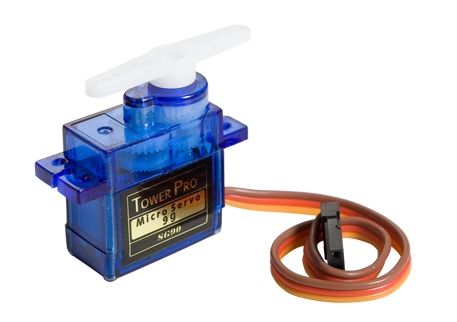A Swift library for the SG90 servo motor, that can be adapted to work with other servos (9g ES08A, SM-S4303R, S3003, ...).
This simple library can control an SG90 servo motor with a PWM, that has a 20ms period and duty cycle that represent these positions:
- 1ms = 5%: -90°, left position
- 1.5ms = 7.5%: -90°, middle position
- 2ms = 10%: +90°, right position
Your servo could have slightly different settings (1-2% difference), play around with the values in the Position enum (expressed in percentage) to find the right duty cycles for your servo.
Every board supported by SwiftyGPIO with the PWM feature, right now only RaspberryPis. And you'll need Swift 3.x, check out the SwiftyGPIO readme for more info on where to find it.
The example below uses a RaspberryPi 2 board but you can easily modify the example to use one the the other supported boards, a full working demo projects for the RaspberryPi2 is available in the Examples directory.
The first thing we need to do is to obtain an instance of PWMOutput from SwiftyGPIO and use it to initialize the SG90Servo object:
import SwiftyGPIO
import SG90Servo
let pwms = SwiftyGPIO.hardwarePWMs(for:.RaspberryPi2)!
let pwm = (pwms[0]?[.P18])!
let s1 = SG90Servo(pwm)
s1.enable()
s1.move(to: .left)
sleep(1)
s1.move(to: .middle)
sleep(1)
s1.move(to: .right)
sleep(1)
s1.disable()Please refer to the SwiftyGPIO readme for Swift installation instructions.
Once your board runs Swift, if your version support the Swift Package Manager, you can simply add this library as a dependency of your project and compile with swift build:
// swift-tools-version:4.0
import PackageDescription
let package = Package(
name: "TestServo",
dependencies: [
.package(url: "https://github.com/uraimo/SwiftyGPIO.git", from: "1.0.0"),
.package(url: "https://github.com/uraimo/SG90Servo.swift.git",from: "3.0.0")
],
targets: [
.target(name: "TestServo", dependencies: ["SwiftyGPIO","SG90Servo"]),
]
)
The directory Examples contains sample projects that uses SPM, compile it and run the sample with sudo ./.build/debug/TestServo.
As everything interacting with GPIOs, if you are not already root or member of a specific gpio group, you will need to run that binary with sudo ./main.



